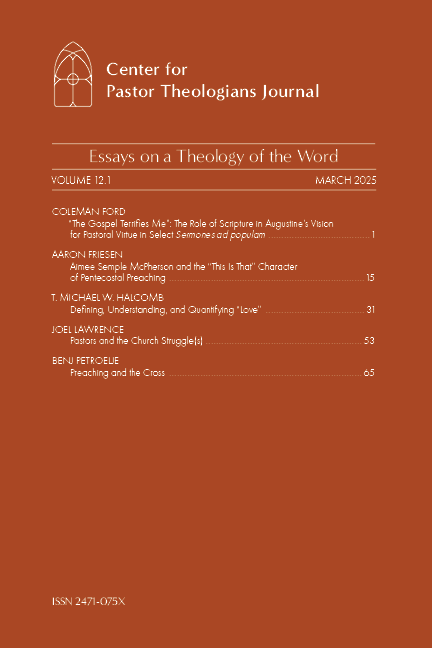Volume 12.1
Essays on a Theology of the Word
Spring 2025
Renewing evangelicalism requires faithful preaching of the word. Though evangelicalism centers the sermon, it does not have a robust theology of preaching. Because of this, non-theologically driven methods often shape the church’s preaching, resulting in preaching that is formed by techniques borrowed from the culture.
Our response to this is to cast a vision for a more robust theological account of preaching for evangelicalism that is rooted in the doctrines of the Word, the Spirit, and the Church. The essays in this volume arise from the reflections of our community on a theology of the Word and preaching. Through these reflections, three themes have taken on central importance in our thinking. First, the Word of God is always God’s Word. God is the initiator of his Word; God ever remains the Lord of his Word and is therefore the proclaimer of his Word. God sends his Word, and he never gives that Word over to humans for us to possess and make our own. Second, the preacher, before being a preacher, is a hearer of God’s Word. If preachers are to be faithful proclaimers, they must only proclaim what they have first heard, submitting to what they hear and humbly offering what they’ve heard to the church. Third, the church also is a hearer of the Word. Christian formation, individually and as a community, occurs under the hearing of the Word of God as confronts his people, calls them to obedience, and comforts them by his presence.
May these essays encourage you as you reflect on a theology of the Word as one being formed by the Word, whether as an instrument of God’s Word as a preacher or as a hearer of the Word as a congregant.
Essays
Defining, Understanding, and Quantifying Love
T. MICHAEL W. HALCOMB
Pastors and the Church Struggle(s)
JOEL LAWRENCE
Preaching and the Cross
BENJ PETROELJE
Book Reviews
Brandon D. Smith. Taught by God: Ancient Hermeneutics for the Modern Church—Coleman M. Ford
George MacDonald, with Timothy Larsen. Diary of an Old Soul—Cole Hartin
Ronni Kurtz. Light Unapproachable: Divine Incomprehensibility and the Task of Theology—Seth Porch
Richard Bauckham. The Blurred Cross: A Writer’s Difficult Journey with God—Andrew Ray Williams
Volume 12.2
Essays on a Theology of the Word
Fall 2025
Essays
Jonathan Edwards’s Harmony of the Word of God
JOSEPH T. COCHRAN
A Living Retrieval of Ancient Exegesis
MICHAEL NIEBAUER
Reviving the Word: Emil Brunner and Evangelical Ecclesial Theology
ANDREW RAY WILLIAMS













